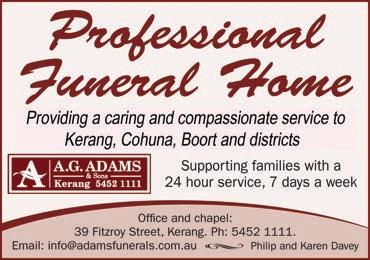
3 minute read
Loud speakers amplify all action of carnival
By JULIE PIENING
LIFE became easier for woodchoppers competiting at the 57th Rheola Charity Carnival in 1927.
Advertisement
In the lead up preparation for the event Mr. H. Mustoe was asked to cart the logs for the woodchop. This made a change from the early days of the wood chopping event in which competitors were asked to supply their own logs.
The following year, new events such as throwing the weight, kicking the football through the hoop and motor driving between the pegs were added to the program alongside the traditional events of foot, cycle and horse racing (gallop and trots).
For the 64th carnival in 1934, Mr. H. Wemyss offered to provide loudspeakers at a charge of £3 for the day.
The offer was accepted and he was asked to bring the wireless as well. As far as can be gathered, this was the first occasion on which an amplifier had been used at the Rheola Carnival Carnival.
Three years later a tournament was organised by the tennis club and was added to the list of events on offer at the Carnival Sports day. Working bees prior to the day were held to get the tennis court prepared for the tournament.
Due to the ongoing war effort, Easter Monday, April 6, 1942, saw the Rheola Charity Carnival sports day cancelled.
The announcement was hard to make but considering the very serious war position, the committee’s decision was considered wise and unavoidable.
It was hard to arrive at this conclusion but with petrol rationing, departure of workers and the ban of the public holiday gave the committee little choice in the matter.
Although the sports day was not going ahead on Easter Monday, the district still had the opportunity to help the local hospitals as the committee decided to make the usual collections over a wide area.
A ball was still held in the Rhe- ola Hall on Easter Monday night in aid of the hall funds and many improvements were carried out at the grounds including making of a cycle track and preparing for the extension of four tennis courts.
As these works are of a permanent nature, they were appreciated in years to come for the Rheola Charity Carnival.
There was good attendance at local carnival meetings in the lead up to Easter in 1943.
But it was decided to discontinue the holding of the sports again due to the ongoing war, but it was agreed to continue the local collections for the hospitals as well as hold a ball in the evening.
Collections have always proved an important addition to the carnival and helped the financial result of the carnival in aid of the Inglewood and Dunolly hospitals.

The ball held in the evening was held in aid of the local hall. The hall committee’s financial position was such that it was necessary to hold an effort once a year.
Just before the outbreak of World War Two, a splendid supper room with all conveniences had been erected.
1. From which language is the word ‘ketchup’ derived?
2. Which is the country with the biggest population in Europe?
3. Who portrayed Edward Scissorhands?
4. What are made and repaired by a cobbler?
5. What is an endoscope used to examine?
6. Apart from womanizing and producing films, what was the other passion of Howard Hughes?
7. What colour are the four stars on the flag of New Zealand?
8. How many states make up the United States of America?
9. Which AFL (VFL) team was \ first co-tenant at the MCG?
10. Mr. Carson is the name of the butler in which popular TV costume drama?
11. Comedy duo Ant and Dec are originally from which English city?
12. In the medical profession, what do the initials ‘GP’ stand for?
Bear Grylls.
13. Who was Australia’s second prime minister?
14. Maris Piper and King Edward are varieties of what?
15. H2O is the chemical formula for what?
16. What Wimmera town was the setting for TV’s Flying Doctors?
17. What is the floral emblem of NSW?
18. Blandenburg, Bremen and Lower Saxony are states in which European country?
19. Complete the title of the play by Shakespeare – ‘The Merchant of …’?
20. By what name is the TV adventurer Edward Michael Grylls more commonly known?





